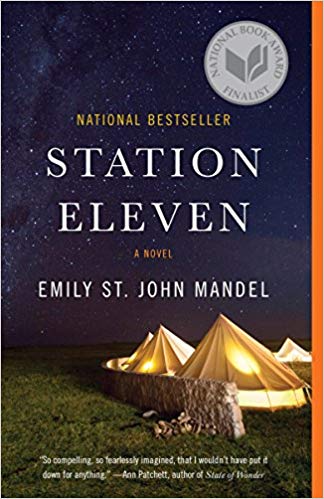Welcome to Read This Book, a newsletter where I recommend one book that I think you absolutely must read. The books will vary across genre and age category to include new releases, backlist titles, and classics. If you’re ready to explode your TBR, buckle up!
This week’s pick is an older, award-winning title that is totally worth checking out if you somehow missed it when it first released! I read it back in 2015 when it was the Great Michigan Read, and again earlier this year. Fair warning, it’s a pandemic novel, which is part of the reason why it likely hit differently the second time around, but one that I think really holds up. Content warning for violence, murder, talk of assault (not on the page) and gaslighting, pandemic and sickness, and religious manipulation and extremism.

Station Eleven by Emily St. John Mandel
In this dual timeline, multi-POV novel, Emily St. John Mandel tells the story of how life as we know it falls apart in the wake of a deadly pandemic that kills 90% of the population in mere weeks, and what life looks like twenty years after this collapse. At the center of the story is Kirsten, who was a young girl acting in a production of King Lear with the famed Arthur Leander on the night the virus broke out. Years later, she’s part of the Traveling Symphony, a ragtag group of actors and musicians who travel through what used to be Michigan, performing at every stop and reminding what remains of humanity that “survival is insufficient.” But when they return to a town they’ve visited before, they find it’s been changed by a self-proclaimed prophet who has a dark vision for the future, and the past and present collide.
I loved everything about this book, from its eerie premise to the gorgeous, lyrical writing, and I especially loved how everything and everyone is connected. The connections are sometimes expected, sometimes surprising, often fleeting, but always impactful. The author does a great job of exploring communities and how individuals can influence a community, exploring the symphony, the Prophet’s followers, and other groups that crop up in unlikely places: gas stations, airports, and on the road.
Being a Michigander, I particularly liked the exploration of the various settings and the descriptions of how settlements re-establish themselves across the landscape. Michigan is a unique setting in that it’s a peninsula surrounded by enormous lakes—in some ways it’s sheltered, in some ways it’s dangerous. The author created a convincing setting that was as unsettling as the premise.
Finally, without giving away too much, what really stuck with me, especially on my second read, was the questions about how a major collective trauma like this affects people. For some, the effect is very external, while for others it’s much more internal. Children who don’t remember much about the before times or never experienced them have a hard time bridging the gulf between adults who know what they’ve lost—not just people, but a way of life and a way of understanding their world, and together they must all create a new one. That was the most powerful part of the novel, and one that I didn’t likely fully appreciate on my first read in 2015, but certainly did when I re-read the book earlier this year.
Bonus: There’s a new miniseries adaptation on HBO Max. I had some quibbles with it, and they do change some things (some I liked, some I didn’t) but overall it was a moving adaptation!
Don’t forget you can get three free audiobooks at Audiobooks.com with a free trial!
Happy reading!
Tirzah
Find me on Book Riot, Hey YA, All the Books, and Twitter. If someone forwarded this newsletter to you, click here to subscribe.